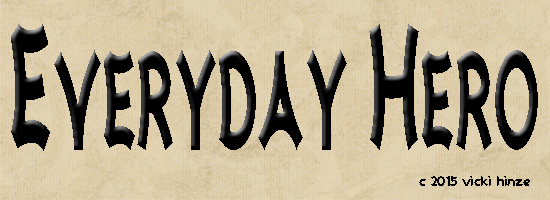We all have our visions of what a hero looks like. We’re all right and probably wrong because, with our preconceived notions, we often overlook the Hero Next Door, the everyday hero, and that hero is often the very one who makes a lifelong impact on specific lives, and on the public who eventually discovers him or her.
The hero I want to talk about today is one we can respect, admire, and one who displayed the courage, and bravery that we can but hope we, in that situation, would emulate.
Heroes are important. More so in the chaotic society in which we find ourselves. Heroes lead, guide, and exhibit in their actions and words the kind of people we aspire to be. Values like integrity, selflessness, and human dignity are inherent. The character traits we see in others and admire and respect.
Too often, we see challenges but are either overwhelmed by them or we think the challenge is too big for us. We’re one person. What can one person do?
The answer is that one person can do a lot—when s/he chooses to act and does it. Let’s get specific and talk about one such hero.
It turns out, this hero wasn’t a big, important, powerful person. It turns out Joe is not the only plumber to achieve fame. This hero, too, became a plumber . . . for a noble purpose.
In World War II, she got a job as a plumber and sewer specialist in the Warsaw ghetto, and she used that as an opportunity to smuggle Jewish infants out in her toolbox so they wouldn’t be killed. Her heroic dog barked when she would come and go through the guard checkpoints at work—trained to do so, to hide any sounds the children might make. This hero saved 2500 children and infants. She kept a record of their names and hid the names in a jar she buried under a tree in her own yard. She helped these children get placed in foster homes and to reunite them with surviving family members after the war. Unfortunately, many of those parents had died in the gas chambers.
The guards eventually caught this woman smuggling children out. Her arms and legs were broken and she was severely beaten. But she survived.
Fast-forward over sixty years. She was up for a Nobel prize, but she didn’t win. (Gore did for a video on global warming.) She should have won, in my humble opinion. But she did what she did not for glory. She did it and took on those formidable risks, to spare the children. And that makes her, in my eyes, a hero.
Here’s are two photos of this hero, Irena Sendler, then and just before her death in 2008. (Credit is given to the unknown photographers.)
My point is that heroes are all around us. Most go unnoticed. But the people to whom the hero made a difference don’t forget. They forever recall the hero’s service and sacrifice, and it’s never a small thing. That’s worth remembering.
The face of a hero well might not be famous, it might be everyday average. But admired and respected? Yes, when known, very much admired and respected.
Some would look at Irena Sendler and see just an average woman. Her’s the face of a hero? But she looks so ordinary, some would say (or think if not bold enough to actually say it). That too is worth remembering.
The face of a hero is often an everyday face. An ordinary face. A stranger’s face. And acts of heroism range from a smile to smuggling children out of a war-torn country. Heroic kind of depends on how badly what is offered is needed. A kind word can be heroic if it comes at a sorely needed time…
Some celebrate celebrity and those who aren’t admirable or the type of people we want to be. Rarely is that the case in the stories we read. In the books we read, we read about the kind of people we hope we would be in similar situations. The everyday heroes among us. That seems like a worthy ambition for us in real life, too.







